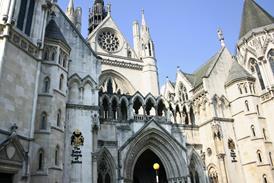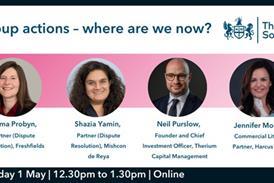Join the Civil Litigation Section for support, advice, networking opportunities and more.
Sandy Mackay, a governor of the Expert Witness Institute and a practising expert in construction for 33 years, explains how to collaborate with an expert.
The first thing that often happens is that the fee-earner in charge the case delegates the task to a junior lawyer. This is fine, so long as they have the information any expert will need to determine if they are appropriate for the case or should recommend someone else.
This includes an outline of what the case is about, the number of issues in dispute, the size of the claim, the timetable and the nature of the parties. Some experts will be reluctant to work for private individuals because of the risk of not getting paid.
Finding the right expert
Then you have to actually find the right person. Some firms have their own databases, while organisations such as the Expert Witness Institute (EWI) are reputable sources. The benefit of instructing a member of the EWI is the reassurance that they have met the technical, legal and quality standards required for membership, and have access to regular updates and training to ensure they stay current.
Using a competent expert will bring benefits to the solicitor such as help in drafting the letter of claim, making it and the case as a whole more precise and cost-effective; otherwise you tend to see claimant solicitors making general claims that they end up having to walk back from later in the proceedings.
Experienced experts are in short supply
Good experts often help pay for themselves in the value they bring to the case, but you don’t know that before you instruct them and have to agree their fee. In truth, most experts are not very negotiable on price – remember that experienced experts are in short supply – and do be wary of those that cut the cost by having someone less experienced do the leg-work.
Note that ‘no win, no fee’ agreements are banned for experts and while you can delay payment until the end of the case, the sensible expert will build this cost of financing into their fee. Insurers are expected to pay monthly in arrears, while individuals may be asked for some payment upfront and to top it up periodically to ensure the expert is never in the red.
Sadly, legal aid rates are such that few experts will work on them, but the Legal Aid Agency can pay a higher rate if the solicitor makes the case for it.
Working together
The quality of instruction is key to the successful engagement of an expert – there is a direct correlation between the quality of instruction and the quality of what an expert can provide. There is a tendency for lawyers to sift the file for the information they think the expert needs, only to omit crucial documents. Send too much rather than too little.
Solicitors also often delay instructing experts because they are wary of incurring the cost, but there are real benefits to getting us in early. In particular, if the case has not yet reached court, I would strongly recommend seeking an initial opinion – rather than the full, CPR-compliant report – in which the expert can provide an assessment of the merits for better or worse. I recall one case that went from an initial damages estimate of £40,000 to £1.4m after I realised that the complaint was just the tip of the iceberg.
There are some who will refuse to act as a single joint expert – I consider it the most difficult and least satisfactory type of expert work – but where the case cannot afford two experts, there is little choice. Ideally, the parties agree the instructions before the expert starts work, but this rarely happens. Instead, the expert usually ends up with at least one party, and sometimes both, becoming irate with the opinion given. You need to let the expert do their job based on the best possible information.
Do not forget about the expert once the trial is done
A more positive development has been the introduction of concurrent expert evidence – known colloquially as ‘hot-tubbing’ – by the 2013 Jackson reforms. This sees all the experts appearing together in court. Typically, with questioning led by the judge, the claimant’s expert starts and the other experts make comments. Though it is only now taking hold in the civil courts, we have found this an excellent way to give evidence. It is pleasing to see that the Civil Procedure Rule Committee is taking steps to encourage its use.
My final plea would be not to forget about the expert once the trial is done. The Family Procedure Rules requires parties to tell their experts about the outcome of the case and we are pushing for the CPR to follow suit. This is useful for us for various reasons – not least professional satisfaction – while it is also helpful to know what the solicitor wants done with the case papers.
Given how central experts are to cases, it is surprising how little attention they are sometimes paid by the lawyers who instruct them. In my long experience, the best outcome for client, lawyer and expert alike always comes from a close working relationship from the beginning of the case to the end.

















